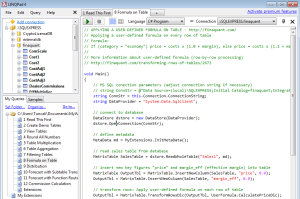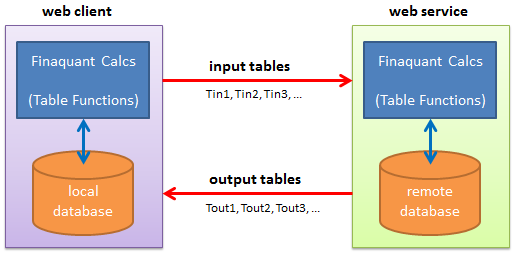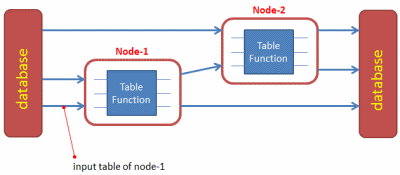Important update on 16. February 2019: Some links, and especially download links on this website may not work properly as I recently transferred the whole site from www.finaquant.com to software.tuncalik.com
Check my shared folder MyAnalyticalSoftware_AllDownloads for most uptodate downloads. Open-Source downloads of the C#/.NET libraries Finaquant Calcs and Finaquant Protos are also included in this shared download folder as zipped Visual Studio 2012 files. You may contact me if you need consulting for my analytical software (C#/.NET, Matlab, Python, R).
Download finaquant® calcs – Commercial .NET Library with primary features:
1) Table-valued Functions
2) Calculation Nodes & Networks
The initial 30-day evaluation license can be extended by purchasing a license for permanent use.
1 hour with Table Functions may replace 100 hours of SQL-Programming
Responsibility of use:
Finaquant Analytics provides no warranties for finaquant® calcs, and accepts no liability for direct or consequential damages caused by the use of this software product.[/expand]* Before buying a license please make sure that you read, understand and agree with the license conditions above.
* See installation for requesting and validating a permanent license key.
* Owner of a permanent license can install and use all future releases of the library.
* Don’t hesitate to contact us for any inquiries, special licenses (product, service etc.), training and project support.
All table operations and calculations with in-memory data, just like matrices!

Table Functions of finaquant® calcs can be compared to well-designed stored procedures of database engines like Oracle and MySQL, with the difference that table functions operate on in-memory tables.
| related downloads | related article | download by | price |
| User Guide for Finaquant Calcs (4695 downloads) | everyone | free | |
| Class Library Document for Finaquant Calcs (4263 downloads) | everyone | free | |
| MS Visual Studio project FinaquantCalcsStarter (4715 downloads) | Installation | everyone | free |
| Finaquant Calcs in a Nutshell (4579 downloads) | everyone | free | |
| New Excel Add-in for Table Functions | Empowering Excel.. | everyone | free |
| New User Guide for Table Functions in Excel (pdf) | everyone | free | |
| New Finaquant Calcs 1.06 installation file (.NET2) (3612 downloads) | members-only | free |
Half of Business Intelligence
Business Intelligence is all about (1) Table Valued Functions, and (2) Data Visualization.
Hence, combined with a reporting library like Crystal Reports table function library finaquant® calcs offers a versatile but affordable solution for Business Intelligence.
NEW: Table Functions in Excel
Install an excel add-in and start testing table functions within a minute. More info

A .NET Calculation Engine based on Table Valued Functions
- Analytical table-valued functions with in-memory tables as input and output parameters (like standard formulas in excel)
- Standard methods can be extended with user-defined table functions (like user-defined formulas in excel).
- Table Functions can replace database programming for analytical operations on data tables.
- Table Functions can be compared to Matrix Functions of math software like Matlab or R, with the difference that their input & output parameters are data tables instead of matrices.
- Library includes methods to store multiple arrays of data tables in a relational database like MS SQL or MySQL. Tables can also be stored in XML files.
- Calculation Nodes & Networks can be used to implement modular, scalable and easily extendable Calculation Engines for complex rule-based computations.
- Table Functions can be integrated with other libraries (incl. math software like matlab and R) for matrix & vector operations (see related articles and forum posts).
Microsoft Visual Studio project with Table Function Examples
Download Visual Studio project FinaquantCalcsStarter which is the best training tool for Getting Started with Table Functions. There is a Demo Function for every group of Table Functions, including an example for Sales Commissions with a Calculation Network.

NEW Easy installation with standard NuGeT Package
finaquant® calcs can easily be installed directly from a Visual Studio project as a standard NuGeT package. Steps for installation are:
- Open and Save a new Visual Studio project.
- From the Tools menu, select Library Package Manager, then click Package Manager Console.
- Enter following command in Package Manager Console:

That’s it; the latest release of finaquant® calcs will be downloaded and referenced to your Visual Studio project automatically.
NEW Quick Start with Table Functions of finaquant® calcs
- Open and Save a new Visual Studio project (console application in C#) named QuickStartCalcs
- Install finaquant® calcs with its NuGet Package using the Package Manager Console (required steps are explained above)
- Coply and Paste following example C# code into the program file Program.cs, and Run
using System; using System.Collections.Generic; using System.Linq; using System.Text; using FinaquantCalcs; namespace QuickStartCalcs { class Program { static void Main(string[] args) { #region "Create data tables" //******************************************************* // First, create some data tables of type MatrixTable //******************************************************* // define meta data (all table fields) MetaData md = MetaData.CreateEmptyMetaData(); MetaData.AddNewField(md, "category", FieldType.TextAttribute); MetaData.AddNewField(md, "product", FieldType.TextAttribute); MetaData.AddNewField(md, "brand", FieldType.TextAttribute); MetaData.AddNewField(md, "costs", FieldType.KeyFigure); MetaData.AddNewField(md, "price", FieldType.KeyFigure); MetaData.AddNewField(md, "margin", FieldType.KeyFigure); // define fields of CostTable var CostTableFields = TableFields.CreateEmptyTableFields(md); TableFields.AddNewField(CostTableFields, "category"); TableFields.AddNewField(CostTableFields, "brand"); TableFields.AddNewField(CostTableFields, "product"); TableFields.AddNewField(CostTableFields, "costs"); // create CostTable with elements MatrixTable CostTable = MatrixTable.CreateTableWithElements_A(CostTableFields, "Notebook", "Ignor", "Ignor UX Notebook", 850.0, "Notebook", "Ignor", "Ignor AX Notebook", 950.0, "Notebook", "Euphor", "Euphor 5 Notebook", 1200.0, "Notebook", "Euphor", "Euphor 10 Notebook", 1450.0, "Desktop", "Ignor", "Ignor 4D Desktop", 650.0, "Desktop", "Ignor", "Ignor 6D Desktop", 800.0, "Desktop", "Euphor", "Euphor 2E Desktop", 1050.0, "Desktop", "Euphor", "Euphor 5E Desktop", 1300.0 ); // define fields of MarginTable var MarginTableFields = TableFields.CreateEmptyTableFields(md); TableFields.AddNewField(MarginTableFields, "category"); TableFields.AddNewField(MarginTableFields, "margin"); // create MarginTable with elements MatrixTable MarginTable = MatrixTable.CreateTableWithElements_A(MarginTableFields, "Notebook", 0.40, "Desktop", 0.30 ); // View tables MatrixTable.View_MatrixTable(CostTable, "CostTable"); MatrixTable.View_MatrixTable(MarginTable, "MarginTable1"); #endregion "Create data tables" // EXAMPLE 1: Table-Scalar Multiplication // Multiply all key figures (numbers) of CostTable by a scalar number MatrixTable CostTable_fractions = CostTable * 1.3333; // view table with fractional numbers MatrixTable.View_MatrixTable(CostTable_fractions, "CostTable after multiplication by 1.3333"); // EXAMPLE 2: Rounding all key figures of a table // round numbers to 2 digits after decimal point MatrixTable CostTable_rounded = MatrixTable.Round(CostTable_fractions, 2); // view table with rounded numbers MatrixTable.View_MatrixTable(CostTable_rounded, "CostTable after rounding"); // EXAMPLE 3: Obtain PriceTable by Table Multiplication // MarginTable specifies margins per category MatrixTable PriceTable = MatrixTable.MultiplySelectedKeyFigures(CostTable, (MarginTable + 1), InputKeyFigTbl1: "costs", InputKeyFigTbl2: "margin", OutputKeyFig: "price"); // view PriceTable MatrixTable.View_MatrixTable(PriceTable, "PriceTable: Prices calculated with margins per category"); // show license information HelpCalcs.ShowLicenseInformation(); } } } |
NEW Run demo queries in LINQPad
You can install the popular development tool LINQPad and begin to test demo scripts with finaquant’s table-valued functions (in C# or VB.NET) within minutes. See required steps..

NEW Building a Web Service with table-valued parameters
You can easily build a web service based on the Web API framework to utilize the power of table-valued functions. Downloads and explanations here..

Primary classes of the .NET library finaquant® calcs
| Class | Description |
| MatrixTable | Central class with table-valued functions (Table Functions). Similar to DataTable object of ADO.NET, a MatrixTable object represents a data table, but with a simpler data structure adapted to analytical table operations. A MatrixTable can be converted to a DataTable, and vice versa |
| MetaData | Global field and hiearchy definitions for all data tables of type MatrixTable |
| TableFields | Class for defining the field structure of a table of type MatrixTable |
| TableRow | A TableRow object represents a row (entry) of MatrixTable |
| DataStore | Reading or writing writing whole tables from/to a relational database (MS SQL or MySQL) together with the table instance information |
| PersistentTableArray | Enables operations with persistent array of tables of type MatrixTable. |
| Node | Calculation Node: Each calculation node hosts a single table function with table-valued input and output parameters of type MatrixTable. |
| Network | Calculation Network representing a network (tree structure) of inter-connected Calculation Nodes. An output table of a node can be input for another node within the network. |
| ConditionCell | Condition Cell for defining and applying filtering criteria (range or value-list) for tables |
| ConditionList | Condition List; array of Condition Cells for defining and applying chained filter criteria for tables |
| DateFunctions | Class for static data functions |
| Utility | Class for various static utility functions |
| KeyMatrix | Class for Matrix operations with key figures (numbers) of type double |
| NumMatrix | Class for Matrix operations with numeric attributes of type integer |
| TextMatrix | Class for Matrix operations with text attributes of type string |
| KeyVector | Class for Vector operations with key figures (numbers) of type double |
| NumVector | Class for Vector operations with numeric attributes of type integer |
| TextVector | Class for Vector operations with text attributes of type string |
| HelpCalcs | General product, copyrights and release information |
Note: You may download Class Library Document for Finaquant Calcs (4263 downloads) for a complete list of classes, methods and properties.
Table Functions in finaquant® calcs
- Getting Started with Table Functions (a short tutorial)
- Defining fields and hierarchies centrally in MetaData (data universe)
- Converting a MatrixTable to a DataTable, and vice versa
- Creating tables manually
- Creating test tables by combinations
- Importing/Exporting tables to/from Excel and XML files
- Table element, row and column operations
- Table arithmetics (addition, subtraction, multiplication, division)
- Table aggregation functions
- Combining (joining) tables
- Table transformation functions (incl. row-by-row processing with user-defined formula)
- Filtering and sorting tables
- Filtering and sampling tables by dates
- Subtable transformers1 and function routers2
- Persistent Table Arrays for storing and reading multiple arrays of in-memory tables to/from a relational database like MS SQL or MySQL
Video Introductions
 5-Minute Introduction to Finaquant Calcs |
 Table Function Demo with Excel |
finaquant® calcs CAN be used for following purposes:
- To implement analytical relationships (function trees) quickly and efficiently without tedious database programming (SQL, stored procedures etc.).
- Once the analytical relationship (function tree) is implemented, all sorts of quantitative analysis can be carried out by programmatically varying the input values to generate some graphical reports for decision support, like forecasts and estimations, scenario analysis, simulations and optimizations.

You can connect math software like Matlab, R or ILNumerics with the Calculation Engine implemented with finaquant® calcs for simulations, reporting and data visualization.
Relevant Applications
- Machine Learning, Artificial Intelligence
- Statistical Estimations/Predictions/Simulations/Optimizations in Business & Science
- Business Intelligence & Analytics (incl. Financial Planning, OLAP)
- Rule-based Commission/Fee/Performance/Bonus calculations
- Analytical Data Processing for Reporting
- Web or Data Services with tables as input/output data
… wherever analytical operations on historical data tables are involved.
finaquant® calcs CANNOT be used for following purposes:
- Daily business transactions like data registration or updates, and queries; this is a software for analytical computations only.
- Data Visualization: Presenting sections and views of existing data with well formatted tables and graphs.
- Data Mining: Automated detection of analytical relationships, classifications, correlation analysis..
Why you might need finaquant® calcs
- You need to implement some analytical computations that are too complex for excel sheets.
- You find no other choice to implement these computations other than time-consuming database programming.
- Existing implementations (with any business application, or database programming) may not be not atomic, independent or flexible enough for scenario analysis and simulation.
- To automate whole calculation processes including tasks like reading/writing data tables from/to databases, data validation, custom events functions triggered at configured stages.
Application Scope
finaquant® calcs can be used for both operational and analytical purposes.

Examples for operations:
Calculation of Dealer or Sales Commissions, Performance Fees etc. to ultimately produce some invoices.
Examples for decision support:
Simulations for prediction models or optimizations, like estimated sales or expected commission amounts.
Tables In, Tables Out
Solving analytical problems needs a holistic approach ignoring artificial business classifications like marketing analytics, risk analytics, commission or performance analytics, and so on.

In all these analytical applications you have some input tables, and you apply some analytical operations on these input tables to generate some meaningful output tables.
Why Table Functions?
- To save much time and money for analytical database and table operations; you don’t need to invest in expensive software and consultants for Business Intelligence which is essentially Table Analytics.
- A single general-purpose table function of finaquant® calcs can save you many weeks of sql-based database programming.
- To convert database programming into table mathematics; focus on analytical essentials. If you can use excel and write macros you can learn table functions within weeks.
- Audio: Why Table Functions?
Calculation Nodes & Networks

Briefly, this is what a Calculation Node does:
- Reads all input tables from databases or from the output of a another node.
- Validates all input tables.
- Executes the assigned table function to generate output tables.
- Validates all output tables.
- Writes output tables to the configured data stores.
More Information
- Finquant’s Community Forum
- How to call table functions directly from an excel sheet
- To remain uptodate follow us at twitter, facebook or google+
- Don’t hesitate to contact us for any questions or inquiries.
- See help page for technical user information about Table Functions and Calculation Nodes & Networks.
- Open-Source DataTable Extensions for .NET developers
 Copyright secured by Digiprove © 2013 Tunc Ali Kütükcüoglu
Copyright secured by Digiprove © 2013 Tunc Ali Kütükcüoglu 